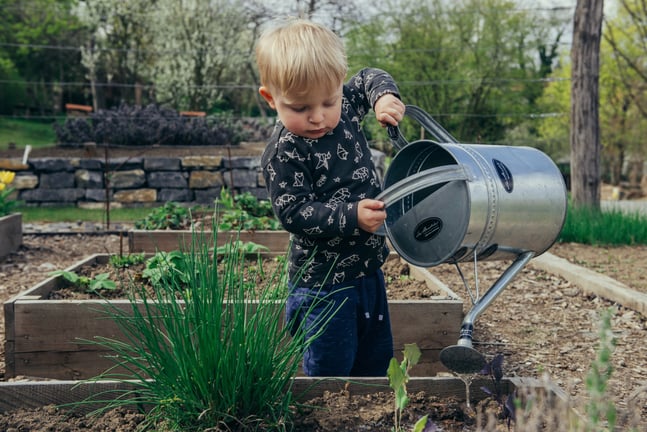Rebuilding Pollinator Habitats
What's a pollinator and why do I care?
The large majority (up to 95%) of all flowering plants need animal assistance with pollination, which allows them to produce seeds and continue their species. Pollinators are any species of animal or insect, including birds, bats, bees and butterflies, that spreads pollen between 180,000 different plant species including over 1200 agricultural species.
Without these pollinators, about a third of our food supply would die off. Since 2006, beekeepers have lost 30% of their bee colonies per year on average. Monarch butterflies have also suffered significant declines due to the loss of native milkweed plants along their migration routes. Other pollinator species have seen similar population declines and even extinctions in certain areas due to a myriad of factors including pesticide use, habitat fragmentation and climate change.
Read more about the decline of pollinators here.
What can you do?
One of the most accessible ways to help your local pollinators is to rebuild some of their increasingly distributed habitats. Planting native wildflower species in your yard or sprinkling seeds along highways, bike paths or other sunny areas could help to reunite and rebuild the disappearing native pollinator populations. Native wildflower seeds can typically be found at your local garden center, online retailers [American Meadows has several Regional Mixes], or harvested for free from your own backyard [How to Collect Wildflower Seeds].
One way to help your seeds germinate is to make seed "bombs" that give them coating of soil or clay to start roots in before they start competing with other established plants. If you haven't seen our video on how to build your own wildflower seed bombs, check out all the dirt-flinging fun to learn more:
Composting
Food and lawn trimmings make nearly 1/3 of solid landfill waste. By recycling your food and lawn scraps at home, you're easing the burden on landfill space, conserving water by reducing runoff, and reducing the need for commercial soil additives which in turn, lowers your carbon footprint. If you have a garden your compost adds key nutrients back into the soil and helps retain moisture for improved plant growth.
Even if you're not a home gardener, just the act of composting is beneficial to the environment so here are a few suggestions for extra compost:
- Add it to potted plants
- Use it as mulch
- Donate it to a local gardening club or school program
- Befriend your neighborhood gardeners and trade it for free tomatoes
- Make potting soil
To get started with composting check out this guide from the Penn State Extension. If home composting seems a little overwhelming but the benefits sound great for your garden look for curbside composting services in your area.
Reduce, Reuse Then Recycle
Recycling is one of the most well known and accessible ways to contribute to the health of the environment but to make the biggest impact first consider some of the things you could be doing to avoid creating recyclable waste to begin with by reducing the need for creating new waste and reusing items that would otherwise end up in a landfill.
Reduce
- Bring shopping and produce bags to the grocery store
- Bring reusable water bottles and coffee mugs with you (BONUS—many coffee shops offer a discount and when you use your own travel mug)
- Use a lunchbox with reusable containers and utensils
- Build a meal plan with your family to reduce food waste
Reuse
- Reuse food jars and takeout containers—these are great for when you want to send food home with dinner guests
- Keep mailing boxes and plastic envelopes for future shipments, moving or organizing at home
- Hit up your local thrift store to shop and donate
- Look for "upcycling" projects for worn or broken items
Recycle
Most municipalities have recycling programs and many are are even free to use these programs generally accept all the things we usually consider to be recyclable: certain plastics, cardboard, aluminum cans and glass, however these vary by location. To ensure that your recyclables aren't being redirected to the landfill follow these tips from Republic waste management:
- Only recycle approved materials
- Don't recycle anything smaller than a credit card
- Keep recyclables loose (un-bagged) unless instructed otherwise by your local recycling company
- Clean and dry all recyclables — even one dirty item can contaminate an entire load of recyclable materials
- Keep your bin clean to avoid contaminating your recyclables
So what about all the other stuff we throw away? Did you know that things like plastic bags, shipping envelopes, baby food containers and cell phones may be able to be recycled too? Check out Earth 911 and BeRecycled.org to find local drop-off locations for all things you didn't think you could recycle.
finding volunteer opportunities
If you really want to get hands-on with a group there are plenty of volunteer opportunities to do so. Here are a few different resources to find ways to volunteer for the environment near you:
- Fish and Wildlife Services: The only agency in the federal government whose primary responsibility is the conservation and management of fish, wildlife, plants and their habitats
- VolunteerMatch: A nonprofit that helps bring people and communities together through service — Search for opportunities
- The Nature Conservancy: A global environmental nonprofit working to create a world where people and nature can thrive
Find more ways to celebrate Earth Day at www.earthday.org
- Pollinators need you. You need pollinators.
Pollinator Partnership - Creating Local, Pollinator-Friendly Habitats with Native Seeds
Ernst Seeds
- Composting is Good for Your Garden and Your Environment
University of California
- Clear. Consistent. Concise. Recycling labels that make sense.
How2Recycle - Recycle the unrecyclable with TerraCycle®
TerraCycle - National Overview: Facts and Figures on Materials, Wastes and Recycling
Environmental Protection Agency




